Saudi Arabia, Iraq Sign Deal For Connecting Power Grids

Saudi Arabia and Iraq have signed a deal for connecting their electricity grids, which can help Iraq with its electricity woes and reduce energy dependence on Iran.

Saudi Arabia and Iraq have signed a deal for connecting their electricity grids, which can help Iraq with its electricity woes and reduce energy dependence on Iran.
The document was inked between Saudi Energy Minister Prince Abdulaziz bin Salman Al Saud and Iraqi Oil Minister Ihsan Abdul Jabbar on Friday, July 15, ahead of Saturday's Jeddah summit of leaders of the Persian Gulf Cooperation Council member states, and leaders from Jordan, Egypt and Iraq and the United States.
Signed between Saudi Electricity Company and the Iraqi Ministry of Electricity, the electrical interconnection will link Arar in northern Saudi Arabia to Yusufiya near Baghdad and have a capacity of 1,000 megawatts and a voltage of 400 kilovolts, with a length of 435 kilometers.
The project constitutes a step to establish a regional market for electricity trade as the Persian Gulf Interconnection Authority also signed a contract to connect its network to the electricity grid of southern Iraq. This contract includes construction of lines from the authority’s substation in Kuwait to the al-Faw station in southern Iraq to supply it with about 500 megawatts of energy from the Persian Gulf countries. Construction work will take about 24 months with a total transmission capacity of 1,800 megawatts.
Iraq has been working with Saudi Arabia on electricity sharing since at least 2020, and in January, they signed a memorandum of understanding on connecting their power grids, prompted by Iran cutting its electricity and gas exports to Iraq.
Despite its immense oil and gas reserves, Iraq remains dependent on imports to meet energy needs, especially from neighboring Iran, which currently provides a third of Iraq's gas and electricity needs.

A delegation of Russian officials visited an airfield in central Iran at least twice in the last month to examine military drones it is looking to acquire for its ongoing war in Ukraine.
The White House released a report on Saturday as President Joe Biden was about to hold a meeting with the leaders of six Persian Gulf countries, plus Egypt, Jordan and Iraq in a regional summit.
Iran began showcasing the Shahed-191 and Shahed-129 drones – both capable of carrying precision-guided missiles -- to Russia at Kashan Airfield south of Tehran in June.
US National Security Adviser Jake Sullivan disclosed satellite photos of drones in flight during the Russians' visit as Iran was showcasing its weapons-capable UAVs. “This suggests ongoing Russian interest in acquiring Iranian attack-capable UAVs," he said.
On July 11, Sullivan revealed that Iran is preparing to train Russian personnel to use its drones perhaps as early as this month, adding, “Our information indicates that the Iranian government is preparing to provide Russia with up to several hundred UAVs, including weapons-capable UAVs on an expedited timeline.”
Yevheniia Kravchuk, an official of Ukrainian President Volodymyr Zelenskyy’s political party, told Iran International on July 12 that the news has shocked Ukrainian officials, noting that Tehran’s decision would lead to the death of more Ukrainian civilians.
Fars News highlighted Friday a phone conversation between Iranian Foreign Minister Hossein Amir-Abdollahian and his Ukrainian counterpart Dymytro Kuleba, in which the Iranian dismissed claims that Tehran was preparing to send drones to Moscow to help its military effort.
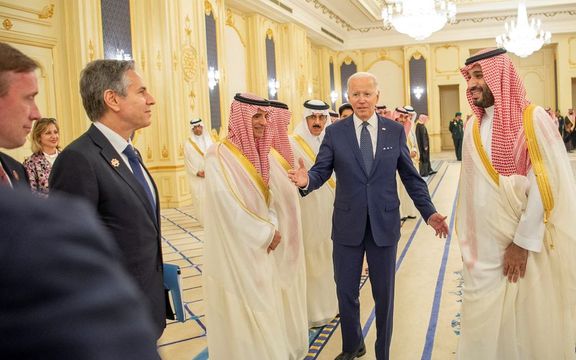
Washington and Riyadh agreed on the importance of stopping Iran from "acquiring a nuclear weapon", during a visit by US President Joe Biden, a joint statement said.
The statement covering the results of bilateral talks included a section on “Security and Defense” which said Biden affirmed the United States’ continued commitment to supporting "Saudi Arabia’s security and territorial defense, and facilitating the Kingdom’s ability to obtain necessary capabilities to defend its people and territory against external threats."
Saudi Arabia and the United States also underscored the need to further deter Iran’s interference in "the internal affairs of other countries, its support for terrorism through its armed proxies, and its efforts to destabilize the security and stability of the region," the statement said.
President Biden began his Middle east Tour by first visiting Israel, where in an interview he said he is willing to consider the use of force against Iran “as a last resort”, which was his first clear statement since assuming office that a military option remains on the table to stop Tehran from building nuclear weapons. He also emphasized that diplomacy to reach a deal with Iran is his priority. But his remark about willing to use force was probably meant to reassure Israel and Saudi Arabia, both opposed to a weak nuclear deal with Iran and vulnerable to a nuclear armed Iran.
Washington and Riyadh also stressed the importance of preserving the free flow of commerce through strategic international waterways such as the Bab al-Mandab and the Strait of Hormuz in the joint statement.
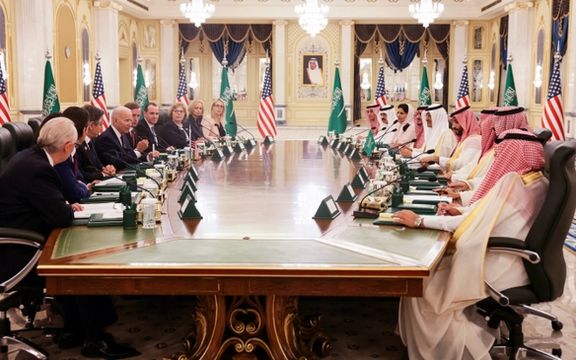
“The United States also emphasized the growing cooperation between the Royal Saudi Naval Forces and U.S. Fifth Fleet’s Task Force 59, which leads an expanding fleet of cutting edge, integrated unmanned surface vessels using artificial intelligence to improve maritime security and domain awareness in support of regional security,” the statement said.
The joint statement appeared to signal a new era of closer partnership between the Biden Administration and Riyadh. Relations were marred by the Biden’s critical stance toward the powerful crown prince Mohammed bin Salman for the killing of journalist Jamal Khashoggi in Turkey in 2018.
Biden said on Friday he told the Crown Prince he held him responsible for Khashoggi’s murder, shortly after exchanging a fist bump with the kingdom's de facto ruler.
"I was straight forward and direct in discussing it. I made my view crystal clear. I said very straightforwardly, for an American president to be silent on an issue of human rights is inconsistent with who we are and who I am," Biden said.
This seems to have put the matter to rest as far as bilateral relations are concerned, in which Biden is eager to get Riyadh’s attentive ear to boosting oil production and lowering gasoline prices that fuel inflation in the United States.
Both Iran and oil production are on the agenda of an Arab summit with the United States on Saturday, where other large Persian Gulf producers will be present. Saudi Arabia and the United Arab Emirates both are the only countries at this point that hold spare oil capacity and can compensate for any shortage triggered by Russia’s invasion of Ukraine.
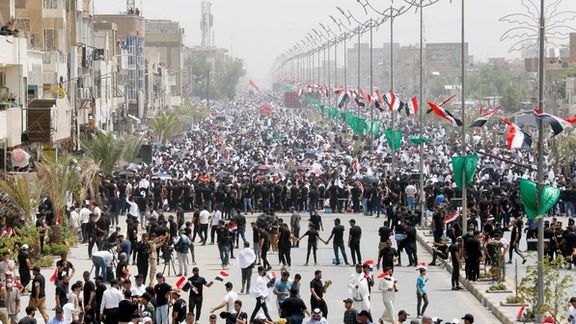
Hundreds of thousands of supporters of Moqtada al-Sadr, the most influential Shiite cleric in Iraq, held a rally on Friday amid stalled talks on forming a new government, a show of force against Iran-backed groups.
Watched by a large security presence, people from across the country filled up Baghdad’s Sadr City's al-Falah Street — the main thoroughfare that cuts across the populist figure's key bastion of support – in a mass gathering considered a show of force by the cleric whose party won the highest number of seats in the October national elections but withdrew after failing to form a government with Sunni and Kurdish allies in Iraq's hectic power-sharing system free of Iran-backed parties that have dominated many state institutions for years.
A day after the rally on Saturday, Iran's hardline newspaper Kayhan criticized the speech by Sadr, saying that such divisive statements will not create unity among Iraqis and will only lead to sedition.
Sadr did not attend the prayer; despite rumors he would deliver a fiery address. Instead, a representative reiterated Sadr's calls for the next government to disband militia groups loyal to Iran and punish corrupt politicians for squandering Iraq's vast oil wealth, apparently directed at his arch rival former Prime Minister Nouri al-Maliki.
In a message read out to his supporters during the service, Sadr -- who is against Iran’s presence in Iraq -- renewed his call to dismantle outlaw armed factions, referring to Iran-backed Shiite militia Hashd al-Shaabi, also known as Popular Mobilization Forces, which was led by former Iraqi militia commander Abu Mahdi al-Muhandis before he was killed alongside Qasem Soleimani in January 2020 by a US drone strike.
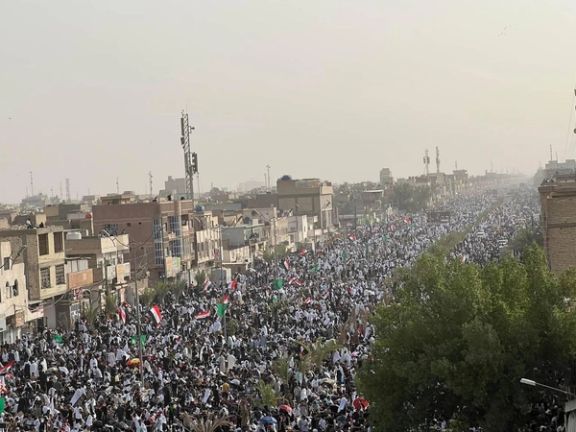
Sadr reiterated his demand to reorganize the Hashd al-Shaabi and keep it away from foreign interventions – an indirect reference to Iran – adding that the ranks of these forces should be cleansed of incompetent people.
He also said Hashd al-Shaabi should not be involved in sectarian conflicts, noting that they should withdraw from the Sunni-dominant areas.
Moreover, Sadr also called for more authority and respect for army and police forces, saying that outlaw groups should not be able to intervene in military matters.
He noted that "It's not possible to form a strong Iraqi government with unlawful militias. You must dissolve all those factions... "the first step to repentance is to punish the corrupt without delay".
The Shiite cleric added that most of those who hindered forming the government, "do not believe, deep down, that loving the homeland is part of their faith, and chose to belong to foreign parties. I invite them to prioritize their love for the homeland, and deal with other countries reciprocally."
"Sadr was here watching us. Loyalty is about answering his call," Reuters quoted Safaa al-Baghdadi, a 42-year-old religious instructor who works in the southern holy city of Najaf, as saying. "His message to the political establishment is to disband the militias who killed Iraqis," he said, referring to mass anti-government, anti-corruption protests in 2019 when police and militias shot hundreds of peaceful demonstrators. "He's also telling Iraqis - if you rise up, I'll support you. We'll do whatever he says.”
"We could be millions strong today," said Riyadh Husseini, 42, a manual laborer from the southern town of Hilla who travelled to Baghdad and slept on the street overnight in front of the podium where he hoped Sadr would appear. "If Sadr calls for the removal of the corrupt parties in power, they'll be gone within the hour," he said.
The success of the Sadrist bloc in the election had raised the possibility that he could sideline his Iranian-backed rivals who had dominated politics in Iraq for years, but political disagreement among parties hindered parliament from electing a president and forming a government.
Late in June, about two weeks after the mass resignation of the Sadrist bloc, Iraq's parliament swore in dozens of new lawmakers, giving majority to Iran-backed politicians in the assembly.
Earlier in June, Iraqi Foreign Minister Fuad Hussein criticized the Islamic Republic’s interference in Iraq's internal affairs, saying Baghdad's tone has changed vis-à-vis Tehran, noting that Iranian interference in Iraq is “unacceptable."
“We have told our Iranian brothers that we are geographical neighbors and that will stay...therefore we need cooperation, we do not need interference from Iran. Interference in Iraqi affairs cannot be accepted from any state,” Hussein said.
Divisions between Sadr and the Iran-aligned groups as well as Kurds vying for the post of Iraqi president have already forced the country into its second-longest period without an elected government. The country is currently being run by the outgoing government of Prime Minister Mustafa al-Kadhimi.
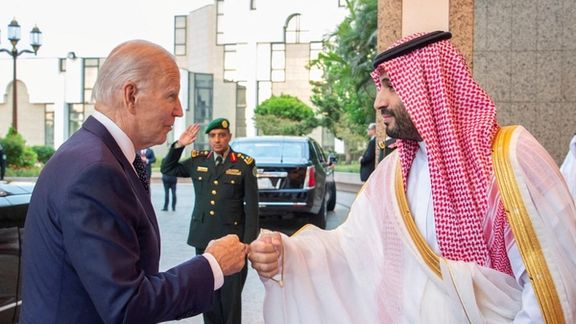
US President Joe Biden began his Saudi Arabia visit Friday with journalists and photographers looking for any signs revealed by choreographed meetings.
Air Force One touch-downed at 6pm local time, following a direct flight from Israel to Saudi Arabia portrayed by United States officials as evidence of Saudi Arabia’s decision to allow Israeli overflights. Biden headed to the Jeddah al-Salam royal palace where he fist-bumped Crown Prince Mohammed bin Salman before pictures showed him in an ornate diwan with 86-year-old King Salman bin Abdulaziz.
This was not the decidedly low-key welcome for President Barack Obama in 2016 after he had suggested in Atlantic magazine that the Saudis needed to “share” the region with Iran. But neither was it the flamboyant welcome for President Donald Trump in 2017, when the former reality television star joined in a sword dance.
Nonetheless, within minutes of Prince Mohammad greeting the president, the Saudi Foreign Ministry website posted pictures showing them together.
Biden’s regional tour is attempting to balance various pressures and interests. The summit meeting Saturday of the Gulf Cooperation Council countries with Egypt, Iraq and Jordan, will have Iran high on the agenda, and is expected to give some endorsement to developing air-defense cooperation with Israel aimed primarily at Iranian drones and missiles.
But despite a threat of force in the last resort to stop an Iranian bomb, Biden also was clear in Israel that he remains committed to diplomacy aimed at reviving the 2015 Iran nuclear deal, the JCPOA (Joint Comprehensive Plan of Action), which the Israeli leadership opposes.
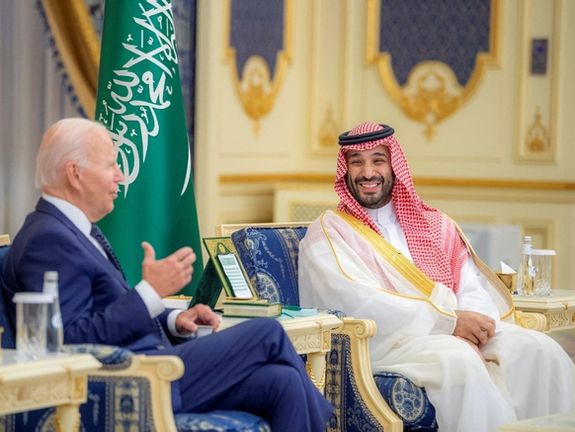
Although media attention in the US has focused on prospects for the Saudis pumping more oil and relieving inflationary pressures that have sent American gasoline prices towards $5 a barrel, US National Security Adviser told reporters en route to Jeddah that any action would be “done in the context of Opec+.” The grouping of oil producers, led by Saudi Arabia and Russia, has agreed only modest adjustments to cutbacks during the worst of the Covid-19 pandemic and is not due to meet until August 3.
Some analysts argue that Saudi Arabia and the United Arab Emirates are hedging as they see Biden trying to follow Trump in reducing the direct US role. Hence both have developing diplomatic contacts with Iran and have not cut back ties with Moscow despite the Ukraine crisis.
Divided Democrats
With so many international uncertainties, a sense that Biden may be a one-term president has been enhanced both by Democrats critical of his leadership and by polling evidence. A New York Times/Siena College poll published this week found 64 percent of Democrat voters saying they wanted someone other than Biden to stand in 2024, with his age at 79 years (33 percent) vying with this performance (32 percent) as the main reason.
‘Progressive’ Democrats are uneasy both about Biden’s performance in Israel, when they feel he failed to highlight Palestinian rights, and his developing relationship with the Saudi crown prince, who US intelligence reported was involved in planning the 2018 murder in Turkey of Washington Post journalist Jamal Khashoggi.
NBC News reporter Peter Alexander wrote on Twitter than a Saudi aide “grabbed my arm tightly” after he shouted “Jamal Khashoggi, will you apologize to his family?” Both Prince Mohammad and Biden ignored the question.
But there are also Democrats who believe – alongside many Republicans – that Biden, regardless of human rights issues, should press ahead with building new regional security arrangements including the Saudis.
Ahead of Biden’s regional trip, Robert Menendez, the Democrat Chair of the Senate’s Foreign Affairs Committee, issued a statement Tuesday arguing he needed to “unite regional actors as a strong counter-weight to an Iran intent on bolstering its nuclear capabilities and menacing its neighbors.” Menendez opposed the JCPOA in 2015 and said in May its revival was not in US interests.
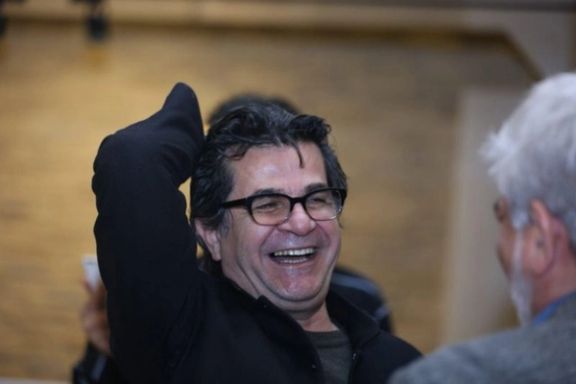
France has called on the Islamic Republic to release three film makers arrested earlier in the month in the latest criticism of Iran's record over human rights by major Western powers.
On Friday, the French foreign ministry specifically named the three Iranian award-winning filmmakers who were arrested on July 8 and 11 – namely Jafar Panahi, Mohammad Rasoulof and Mostafa Aleahmad.
Earlier in the week, the Cannes Film Festival, the Berlinale, the European Film Academy and the International Coalition for Filmmakers at Risk also called for the immediate release of the prominent filmmakers.
Panahi, who has won numerous awards, including the Golden Leopard at Locarno Festival, the Golden Lion in Venice, and the Silver Bear at the Berlinale, was arrested July 11 as he was protesting the detention of two other award-winning filmmakers Mohammad Rasoulof and Mostafa Alehahmad.
Rasoulof – another prominent filmmaker with several international awards such as the Golden Bear – and Alehahmad – who is known in international film galas for his short works -- were arrested July 8 as part of the Iranian crackdown on the signatories of a collective statement titled “Lay down the gun” issued by more than 100 film industry personalities in the end of May.
The statement called on military and security forces who “have become tools for cracking down on the people,” not to suppress protesters during a wave of protests across Iran that were triggered when a 10-story building collapsed in Abadan, leaving at least 40 people dead and dozens missing.